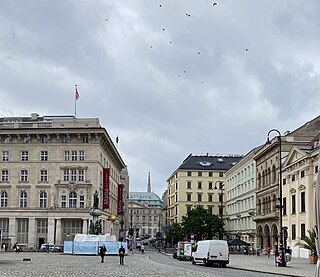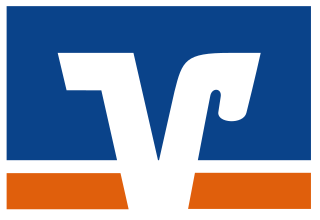
A savings bank is a financial institution that is not run on a profit-maximizing basis, and whose original or primary purpose is collecting deposits on savings accounts that are invested on a low-risk basis and receive interest. Savings banks have mostly existed as a separate category in Europe.

The Creditanstalt, full original name k. k. priv. Österreichische Credit-Anstalt für Handel und Gewerbe, was a major Austrian bank, founded in 1855 in Vienna.

KBC Group is a Belgian universal multi-channel bank-insurer, focusing on private clients and small and medium-sized enterprises in Belgium, Bulgaria, Czech Republic, Hungary, and Slovakia. It was created in 1998 through the merger of Kredietbank (KB), the cooperative CERA Bank, ABB Insurance, and Fidelitas Insurance. The acronym KBC refers to KredietBank and CERA.

BAWAG was a bank in Austria founded in 1922. On October 1, 2005, it merged with the separate Österreichische Postsparkasse (P.S.K.) to form the "Bank für Arbeit und Wirtschaft und Österreichische Postsparkasse AG", shortened as BAWAG P.S.K. In October 2017, BAWAG Group AG, the holding company of BAWAG P.S.K., became a listed company on the Vienna Stock Exchange. Largest shareholders are GoldenTree Asset Management (21.8%) and T. Rowe Price (5.6%).

DZ Bank AG is the second largest bank in Germany by asset size and the central institution for around 800 cooperative banks and their around 8,500 branch offices. Within the German Cooperative Financial Group, which is one of Germany's largest private sector financial service organizations and manages assets of around 1.200 trillion euros, DZ Bank functions both as a central institution and as a corporate and investment bank.

Raiffeisen Zentralbank Österreich A.G. (RZB) was a significant bank in Austria and the central institution of the Raiffeisen Banking Group (RBG) until its merger into its subsidiary Raiffeisen Bank International (RBI) in 2017.
De Volksbank is a Dutch retail bank offering financial products to both companies and individuals. Prior to a 2017 restructuring, it was called SNS Bank, which remains its major brand name. It became a subsidiary of SNS Reaal in 1997 when the holding company bought the insurance company Reaal. The bank and its parent were rescued by the Dutch government in 2013 and have been state owned since then. In 2016, SNS Bank was the fourth-largest bank in the Netherlands in terms of total assets.

The Raiffeisen Banking Group is a group of cooperative banks in Austria. The Austrian Raiffeisen banks are not consolidated under a single parent entity but are financially linked through a common institutional protection scheme and deposit guarantee scheme. The group's international operations, by contrast, are consolidated under Raiffeisen Bank International (RBI).

The banking system in Austria plays a pivotal role in the country's economy, ensuring financial stability and providing essential services to both individuals and businesses. The Austrian banking system is characterized by a three-tier structure, consisting of joint-stock banks, savings banks (Sparkassen), and cooperative banks.

The German Cooperative Financial Group is a major cooperative banking network in Germany that includes local banks named Volksbanken and Raiffeisenbanken, the latter in tribute to 19th-century cooperative movement pioneer Friedrich Wilhelm Raiffeisen. The Cooperative Group represents one of the three "pillars" of Germany's banking sector, the other two being, respectively, the Sparkassen-Finanzgruppe of public banks, and the commercial banking sector represented by the Association of German Banks.

Crédit Mutuel is a French cooperative banking group, one of the country's top five banks with over 30 million customers. It traces its origins back to the German cooperative movement inspired by Friedrich Wilhelm Raiffeisen in Alsace–Lorraine under German rule, in the 1880s. Crédit Mutuel was a member of the International Raiffeisen Union (IRU).

Erste Group Bank AG is an Austrian financial service provider in Central and Eastern Europe serving 15.7 million clients in over 2,700 branches in seven countries.
The Raiffeisen Landesbank Südtirol – Cassa Centrale Raiffeisen dell'Alto Adige is the central banking institute of the 39 independent cooperative Casse Rurali/Raiffeisenbank in South Tyrol, Italy.
Banque Raiffeisen is a Luxembourgish banking and financial services company. Founded in 1926, it is one of the oldest banks in Luxembourg. The bank is independent from foreign shareholders. It is a member of the International Raiffeisen Union (IRU), which is an association of cooperatives based on the ideas of Friedrich Wilhelm Raiffeisen.

Sberbank Europe Group was a banking group headquartered in Vienna, Austria, and owned by Sberbank, a Russian state-controlled company. Sberbank Europe provided financial services to over 780,000 customers in eight countries in Central and Eastern Europe. It was liquidated in early March 2022 following the Russian invasion of Ukraine.
Raiffeisenbank or Raiffeisen Bank refers to cooperative banks in Europe that are rooted in the early credit unions of Friedrich Wilhelm Raiffeisen. The name is found in:
Bausparkasse Schwäbisch Hall AG is a building society in Germany, active abroad with subsidiaries in Eastern Europe and China. It has more than 10 million customers. Shareholders are the cooperative central bank DZ Bank in Frankfurt am Main and around 600 cooperative banks. The building society has its headquarters in the city of Schwäbisch Hall in Baden-Württemberg.

Raiffeisenlandesbank Oberösterreich AG is a credit institution and grouping of cooperative banks founded in the 1900s and headquartered in Linz, Austria. It is the central institution of the Raiffeisen Banking Group in Upper Austria and the largest of Austria's eight provincial central banks.

The Länderbank, full original name k. k. privilegierte Österreichische Länderbank, was a major Austrian bank, created in 1880. In 1922 its head office was moved to Paris under the name Banque des Pays de l'Europe Centrale, even though its activity remained overwhelmingly in the Austrian operations. After the 1938 Anschluss the latter came under control of Dresdner Bank by the name Länderbank Wien. It was nationalized in 1946, renamed Österreichische Länderbank AG in 1948, and eventually merged in 1991 with Vienna's Zentralsparkasse to form Bank Austria, which in turn has been a subsidiary of UniCredit since 2005.

The Sparkassengruppe Österreich brings together all savings banks in Austria. Tracing its origins to 1819, it serves around 4 million customers in 797 branches with more than 15,500 employees, with a customer share in Austria around 31.2% as of December 2022. The group has a complex decentralized structure but relies critically on Erste Group Bank AG, which owns the main local savings bank in Vienna, operates central functions, owns and manages subsidiaries outside of Austria, and consolidates group accounts. The Österreichischer Sparkassenverband acts as the group's national representative body.

















